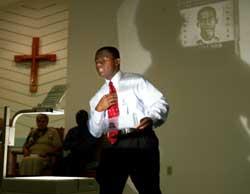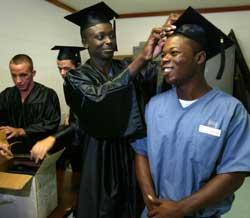| Want to send this page or a link to a
friend? Click on mail on at the top of this window. |
| 'Maybe you'll listen now': Ex-convict tries to guide inmates
toward right path |
In the room at Hendry prison, you can hear a pin drop. Michel Petihomme, convicted of
murder at age 16, is showing inmates his mug shot on a large screen, showing them
newspaper pictures of his old friends.
| Most are in prison. Or dead. He is telling inmates that they
don't have to end up like this, that they have a choice. He is telling them about his
life -- how he started down a path that surely would have led to life in prison, and how
he turned that around.
"Maybe someone tried to help you, tried to challenge you, but you didn't
listen," he tells them."Maybe you'll listen now." |
|
|
 |
|
Michel Petihomme projects his mug shot on a screen as he
lectures inmates at Hendry Prison in Hendry County. (Miami Herald Photo / Charles Trainor) |
|
|
|
 |
|
Charles Trainor Jr./Herald staff grad: Inmate Evens Majuste
adjusts Demonds Turner's cap before a GED ceremony at Hendry Prison in Hendry County
recently. |
|
For years, police delivered Petihomme to the Miami-Dade County Jail or Juvenile Justice
Center, plastic cuffs pulled tightly around his wrists. He had been there enough to know
the routine: fingerprints, mug shot, disinfectant spray.
By 13, he was classified by the justice system as a repeat offender -- a futureless kid
headed toward death in prison or on the street.
But Petihomme, 27, beat the odds. And now, 11 years after his felony murder conviction,
he regularly goes to prisons all over Florida to tell how he did it.
''You're just like I used to be,'' he recently told Hendry County inmates, ages 18 to
24. ``You want to belong. You want to be accepted.''
The Herald first wrote about Petihomme 11 years ago. He was an inmate in the Juvenile
Justice Center, waiting for his murder trial, a kid with a history like many others in the
prison at Hendry. According to the Florida Department of Corrections, 585 teenagers 18 and
younger are in prison in Florida -- and 112 of them are 16 or younger.
''Look what you're taking your mothers and grandmothers through. You say you love them,
but look what you're pulling them through,'' he tells the Hendry inmates.
CAME FROM HAITI
At 8, Petihomme came to Miami from Haiti. His mother had a new family, and he felt left
out. He felt left out at school, too, when the kids teased him about his worn clothes and
accented speech. At 10, he took a knife to school and threatened to kill another kid. He
got expelled and arrested. At 11, he was arrested over and over for shoplifting and
stealing bikes. By 13, he had a thug's record: larceny, theft, breaking and entering,
armed robbery. His mother, who only understood Creole, would show up in court weeping and
confused. But Petihomme didn't care. He was getting respect on the street.
At 14, he hit it big: He was on the television news, dubbed ''the youngest crack dealer
in town.'' He dropped out of school and was averaging $600 a week. He wore Reebok
sneakers, a Fila jacket and 24-karat gold chains. His straight, white, front teeth were
filed down and capped in gold. He drove a Malibu, drank Heineken.
At the Dade County Jail and Juvenile Justice Center, everyone knew him.
By 16, he was in prison for armed robbery and felony murder after driving a stolen
Mazda that hit a wall and killed two passengers, his friends, during a high-speed chase
with police. He spent five years of a nine-year sentence at Brevard Correctional
Institution.
At first, he was bitter and blaming. His best friends had died in the wreck. It
wouldn't have happened if the police hadn't chased them, he told himself. He didn't talk
to anyone and made up his mind to do his time like a zombie, get out and figure out how to
make some quick money.
But then something small happened that affected him in a big way.
He called his mother collect to ask her to send him a Christmas package. He needed a
sweater and tennis shoes. But his mother told him she didn't have the money. That's when
he called one of his old teachers at the Juvenile Justice Center.
Petihomme had called Rita Logan before. She was always encouraging him: ``Get your GED.
Read anything you get your hands on -- books, papers, milk cartons, candy wrappers. Get a
welder's certificate. Do something with your time toward your future.''
Logan had known him since he was 14, when she was his teacher at the Juvenile Justice
Center, a holding facility for juvenile crime suspects. She taught sociology to hard-core
repeat offenders. She used to talk to him after class, telling him if he wanted to be
really tough, he should use his hands, not a gun. Telling him he had robbed people just
like her. Telling him to think about learning a trade so he could get an apartment and
have a family.
''What you really hope for is to get these kids to identify enough with you so that
they'll generalize to other people and be less brutal on the street,'' Logan told a
reporter 11 years ago.
One afternoon, Petihomme told her he was having nightmares about his two best friends
dying in the car accident. ''You didn't mean to kill them,'' she said.
''She was always down-to-earth, practical, never judgmental,'' he says now.
When he called her from Brevard, he asked her for the Christmas package. She said she
couldn't promise anything -- she was very busy and short on cash -- but she would try.
The package arrived a few days before Christmas: a gray V-neck, a white V-neck, a pair
of blue Converse sneakers -- all with the tags still on. She had also put in a new Walkman
and a big bag of Skittles, his favorite candy.
He picked up each item and looked at it. Then, he cried for the first time in years.
SHOWED CARING
Even now, he can't say exactly why it affected him so.
``It had something to do with realizing that she did something she didn't have to do.
It wasn't part of her job, but she went the extra mile. I realized that she really cared
about me.''
That's when he opened up to counselors and chaplains at the prison. That's when he
started to come back into the world.
''I admitted to myself that the death of my two friends was my fault. I could have
pulled over. But I made the choice to run,'' he said. Once he took responsibility, he
says, he was able to deal realistically with his life.
Shortly after, he enrolled in a GED class. When he left prison in 1995, he had a GED
certificate, a welding and air-conditioning repair certificate and a pile of letters
commending him for being a model prisoner.
And, he had resolve.
''I really wanted to get my life straight,'' he said.
Now, when he thinks about it, he knows there were other people who helped him turn
around: a pastor in Miami who befriended him. His mother who ran from the house to greet
him when he first came home from prison and never mentioned his crimes again. Also, he
returned to a law-abiding family. His stepfather is a job placement officer for the
Immigration and Naturalization Service. His mother puts dinner on the table every night.
''It helps if you don't go back to a house of active criminals when you get out of
prison,'' he said.
Petihomme is an infectious disease counselor at a private clinic. He wears a tie to
work, his gold teeth are recapped in porcelain. He lives with his family but is thinking
about getting more serious about a young woman he met in church. He owns a basic
late-model Chevrolet -- ''nothing a kid would want to steal,'' he said.
He does a lot of volunteer work in prisons -- counseling and speeches to get inmates
thinking.
He has a year left at Miami-Dade Community College, majoring in sociology. Then he'll
go to Florida International University.
ON THE OUTSIDE
A few years ago, he went to Turner Guilford Knight, a branch of the Miami-Dade County
Jail, to counsel inmates. An entry guard, who recognized him from his numerous arrivals in
handcuffs, shouted: ``Petihomme, what are you doing on the outside coming in?''
After he got out of prison and had a decent job, he went to the Juvenile Justice Center
and spoke to Logan's class.
''They're listening, Michel,'' she told him. ``You're making a difference.''
In winter 1999, Logan called Petihomme and told him she had ovarian cancer and had
three months to live.
''You're kidding,'' he said. ``Not you.''
He went to visit her several times in the last few months of her life. She died in
April 2000.
Her last words to him: ``Whatever you do, Michel, don't give up.''
And he hasn't.
| Wehaitians.com, the scholarly journal of
democracy and human rights |

